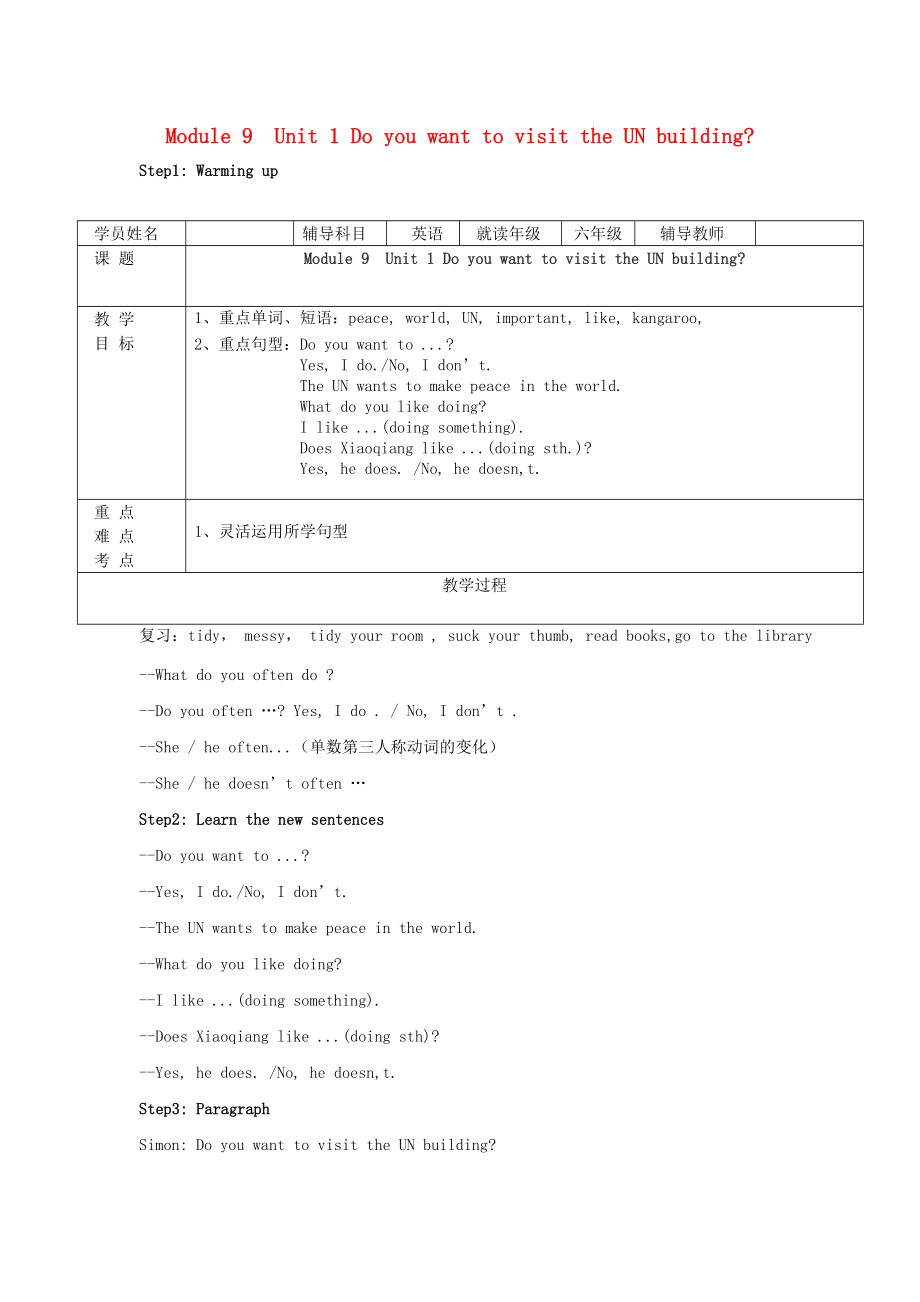《五年級(jí)英語(yǔ)上冊(cè) Module 9 Unit 1 Do you want to visit the UN building教案 外研版(三起)(通用)》由會(huì)員分享����,可在線閱讀�����,更多相關(guān)《五年級(jí)英語(yǔ)上冊(cè) Module 9 Unit 1 Do you want to visit the UN building教案 外研版(三起)(通用)(3頁(yè)珍藏版)》請(qǐng)?jiān)谘b配圖網(wǎng)上搜索����。
1、學(xué)員姓名
輔導(dǎo)科目
英語(yǔ)
就讀年級(jí)
六年級(jí)
輔導(dǎo)教師
課 題
Module 9 Unit 1 Do you want to visit the UN building?
教 學(xué)
目 標(biāo)
1�、 重點(diǎn)單詞、短語(yǔ):peace, world, UN, important, like, kangaroo,
2����、重點(diǎn)句型:Do you want to ...?
Yes, I do./No, I don’t.
The UN wants to make peace in the world.
What
2、 do you like doing?
I like ...(doing something).
Does Xiaoqiang like ...(doing sth.)?
Yes, he does. /No, he doesn,t.
重 點(diǎn)
難 點(diǎn)
考 點(diǎn)
1、靈活運(yùn)用所學(xué)句型
教學(xué)過(guò)程
Module 9 Unit 1 Do you want to visit the UN building?
Step1: Warming up
復(fù)習(xí):tidy����, messy, tidy your room
3��、, suck your thumb, read books,go to the library
--What do you often do ?
--Do you often …? Yes, I do . / No, I don’t .
--She / he often...(單數(shù)第三人稱動(dòng)詞的變化)
--She / he doesn’t often …
Step2: Learn the new sentences
--Do you want to ...?
--Yes, I do./No, I don’t.
--The UN wants to make peace in t
4��、he world.
--What do you like doing?
--I like ...(doing something).
--Does Xiaoqiang like ...(doing sth)?
--Yes, he does. /No, he doesn,t.
Step3: Paragraph
Simon: Do you want to visit the UN building?
Daming: What’s that?
Simon: It’s a very important building in New York. The UN wants to make
5��、 peace in the world. Many countries are in the UN.
Daming: Is China in the UN?
Simon: Yes. China is one of the first countries in the UN.
Daming: Wow! It’s beautiful. It’s very big and tall.
Simon: Haven’t you got buildings like this in China?
Daming: Yes, we have! We’ve got lots of very tall a
6����、nd big buildings in China!
Simon: Really! Do you want to go inside the UN building?
Daming: Yes, please.
Step4:語(yǔ)法復(fù)習(xí)
一般疑問(wèn)句
一、在be動(dòng)詞(am/is/are)和情態(tài)動(dòng)詞(can,?may, must...)提前�,其它照寫。some變成any.
例如:陳述句: They?are?in?the?park. He?can?play the guitar..
一般疑問(wèn)句: Are they not in?the?park���? Ca
7���、n?he not play the guitar��?
二����、借助動(dòng)詞do/does,第三人稱單數(shù)用does�����,其余人稱用do�,助動(dòng)詞提前�����,動(dòng)詞變?yōu)樵?����。特別記?���。呵懊嬗胐oes, 后面的動(dòng)詞一定還原成原形。Some變成any�,I變成you.
例如:陳述句: I like the ducks. He likes the dogs.
否定句: Do you the ducks. Dose he like the dogs?
練習(xí)題
按照要求改寫句子
1. Daniel watches TV every evening.(改為否定句) ____
8、_________________________________________
2. I do my homework every day.(改為一般疑問(wèn)句��,作否定回答)
______________________________________________________________________________________
3. She likes milk.(改為一般疑問(wèn)句����,作肯定回答) ____________________________________________
4. Amy likes playing computer games.(改為
9�����、一般疑問(wèn)句�,作否定回答)
______________________________________________________________________________________
5. We go to school every morning.(改為否定句) _______________________________________________
6. He speaks English very well.(改為否定句) __________________________________________________
7. I like tak
10���、ing photos in the park.(對(duì)劃線部分提問(wèn)) ____________________________________________
8. John comes from Canada.(對(duì)劃線部分提問(wèn)) ________________________________________________
9. She is always a good student.(改為一般疑問(wèn)句�,作否定回答)
___________________________________________________________________________________
11���、____
10. Simon and Daniel like going skating.(改為否定句) __________________________________________
四��、改錯(cuò)(劃出錯(cuò)誤的地方��,將正確的寫在橫線上)
1. Is your brother speak English? __________________
2. Does he likes going fishing? __________________
3. He likes play games after class. __________________
4. Mr. Wu teachs us English. __________________
5. She don’t do her homework on Sundays. _________________
 五年級(jí)英語(yǔ)上冊(cè) Module 9 Unit 1 Do you want to visit the UN building教案 外研版(三起)(通用)
五年級(jí)英語(yǔ)上冊(cè) Module 9 Unit 1 Do you want to visit the UN building教案 外研版(三起)(通用)

